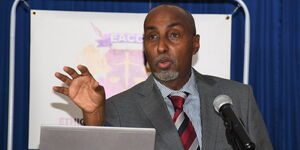Opposition leader Raila Odinga has on several occasions threatened to boycott the October 17 fresh Presidential election and experts have warned that his actions might have dire consequences.
The Supreme Court annulled the Presidential election in September and ordered fresh polls within 60 days, in accordance with the Constitution.
President Uhuru Kenyatta has expressed willingness to participate in the re-election but Odinga has stated that he will not participate unless the Independent Electoral and Boundaries Commission (IEBC) effect changes he has termed as "irreducible minimus".
A section of law experts termed the Opposition leaders threats and demands a pipe dream and warned of a constitutional and political crisis if no election is held soon.
Law Society of Kenya Chairman Isaac Okero called for sobriety from both sides.
"When there are political circumstances or actions or a state not anticipated by the Constitution, that is what is legally defined as a constitutional crisis.
"That is where we would be if elections are not held within the 60 days," he was quoted by the Star.
Jubilee insiders and lawyers allied to the ruling coalition argue that without new polls, President Uhuru Kenyatta will rule until 2022, and might even be eligible for another term.
A close associate of the President said Kenyatta could remain in office until 2022 if no election is held on November 1.
"His second term will start in 2022 if no election is held as ordered by the court. The Supreme Court has to be very careful with its ruling on Wednesday (tomorrow).
"Never dig a hole too deep for your enemy, you may fall in it," the associate, who asked not to be named, said.
Lawyer Faith Waigwa, who chaired the Nominations Appeals Tribunal for Jubilee, said it was possible for Kenyatta to stay in State House for five more years.
"Constitutionally speaking, yes, he can, in light of Article 134, but practically I doubt it would happen.
"If it were to happen, it can't be a second term because the first never ended and for a second term, there must have been an election, not a nullified one and a new swearing-in/assumption of office.
"The crisis then becomes an argument for temporary incumbency under Article 134. Incumbency, if the interpretation of nullification of the election means the first vote is null and void, vis-a-vis the term of the President being five years," she said.
Nzamba Kitonga, former chairman of the Committee of Experts on Constitutional Review, said a rerun in 60 days is essential.
"The elections must happen. The President will continue holding temporary powers until another President is elected and sworn in," he said when asked what would happen to Kenyatta if there's no rerun by November 1.
Constitutional lawyer Bobby Mkangi warned the country was facing "serious political and governance consequences that will end up with a negotiated political settlement."
"If it is of such political gravity, I think at the end of the day we will have to go for a political solution.
"The more we prolong this, the more of gravity this becomes," he said.












